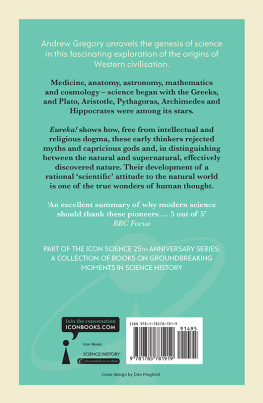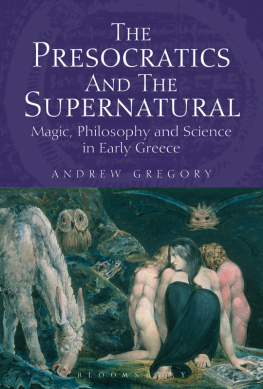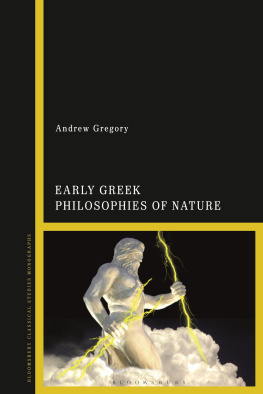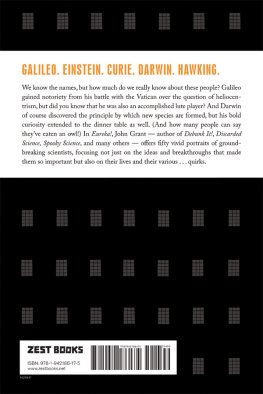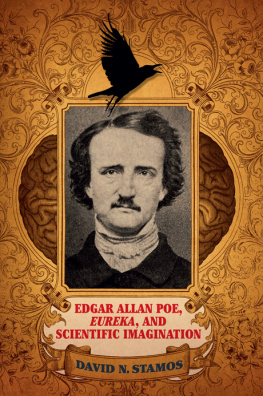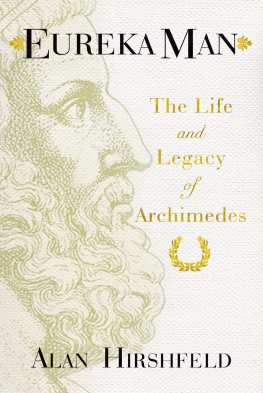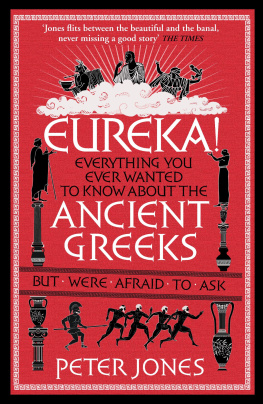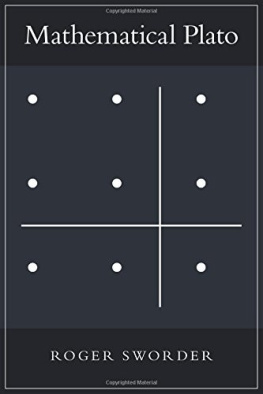Eureka!
The Birth of Science
Andrew Gregory

This edition published in the UK in 2017 by
Icon Books Ltd, Omnibus Business Centre,
3941 North Road, London N7 9DP
email:
www.iconbooks.com
Originally published in 2001 by Icon Books Ltd
Sold in the UK, Europe and Asia by
Faber & Faber Ltd, Bloomsbury House,
7477 Great Russell Street,
London WC1B 3DA or their agents
Distributed in the UK, Europe and Asia by
Grantham Book Services, Trent Road,
Grantham NG31 7XQ
Distributed in the USA by
Publishers Group West,
1700 Fourth Street, Berkeley, CA 94710
Distributed in Canada by
Publishers Group Canada,
76 Stafford Street, Unit 300,
Toronto, Ontario M6J 2S1
Distributed in Australia and New Zealand by
Allen & Unwin Pty Ltd, PO Box 8500,
83 Alexander Street,
Crows Nest, NSW 2065
Distributed in South Africa by
Jonathan Ball, Office B4, The District,
41 Sir Lowry Road, Woodstock 7925
ISBN: 978-178578-191-9
Text copyright 2001 Andrew Gregory
Preface to this edition copyright 2017 Andrew Gregory
The author has asserted his moral rights
No part of this book may be reproduced in any form, or by any means, without prior permission in writing from the publisher
Typesetting by Born Group
Printed and bound in the UK by Clays Ltd, St Ives plc
Acknowledgements
I would like to thank the editors, Jon Turney and Simon Flynn, for their patience and efficiency and for their comments on the manuscript. I would also like to thank Ms. Sheelagh Doherty RGN, RSCN, RM for her support, her comments and for checking the manuscript for medical accuracy. Without their help this would have been a less interesting and less accurate book.
Dedication
For Sheelagh, with love
Andrew Gregory is Professor of History and Philosophy of Science at University College London. His specialisms are in ancient and early modern science, ancient philosophy, and the relation of magic and science. He is also the author of Harveys Heart: The Discovery of Blood Circulation (Icon, 2001), Platos Philosophy of Science (2001), Ancient Greek Cosmogony (2007), The Presocratics and the Supernatural (2011), and Anaximander: A Re-Assessment (2016), all published by Bloomsbury, and Plato: Timaeus and Critias (OUP, 2008).
Preface to the 2017 Edition
This second edition of Eureka! The Birth of Science is largely unchanged in its overall content. My view remains the same. The ancient Greeks made a fundamental and critical contribution to the development of science. That they did so was no miracle. It did not come out of nothing, but built on important work by both the Babylonians and the Egyptians. It was not inexplicable, as many important social changes can be seen to contribute to a society and culture conducive to radical intellectual change. The introduction of democracy, a relative religious freedom and important technological innovations can all be seen as important factors in a new social soil that allowed the rapid production, discussion and adoption of new ideas. Indeed, the growth of science is perhaps best seen as like that of a tree. It has many roots and requires certain conditions to flourish. The growth may at times be a little tangled, but ultimately the branches reach up towards the light. The ancient Greeks were a key root for science and were fundamental in fostering its early growth as the roots came together to form the trunk.
The Creation of Science
Science has done much to shape both the world we live in and the way in which we think about that world. But what are the origins of science? What came before science, and how and why was that transformed into a new and progressive way of thinking about and investigating our world? Who were the people who effected this transformation? When and where did science begin?
Prior to science, there was technology. People knew how to do many useful things, without understanding quite why they happened, or why natural phenomena occurred. When they attempted to explain their world, it was in terms of myths and anthropomorphic gods. So thunder, lightning, earthquakes and disease were all due to the actions of the gods, while the origins of the world and human beings were a matter of myth. These myths often involved the sexual coupling of the gods such as those of sea and sky to create earth since procreation was one of the few models for the production of something new that the ancients possessed. These gods were supposed to have many human fallibilities. They sometimes acted in anger, jealousy or spite, and their actions were often unpredictable to humans.
A good example here is the daily passage of the sun across the sky. What do we see, and how do we explain it? To a pre-scientific society, the sun might well be a god driving his chariot across the heavens. Many primitive cosmologies supposed the universe to be hemispherical. There was a flat earth with a hemispherical bowl of the heavens above it. So the sun would disappear in the evening and reappear each morning, but what happened in between was a mystery the subject of myth. Many ancient societies could accurately predict the time that the sun would rise, and at what point on the horizon. Any sort of scientific explanation of the sun or its motions, though, was beyond them.
At some point, a new and more critical attitude came about. People began to reject myths and explanations in terms of the gods as arbitrary and fanciful. Instead, they began to use theories for which they could gather evidence and debate the merits. They considered their world to be a natural place, in the sense that it was free from supernatural intervention, and so in need of natural explanations. Thunder and lightning were to be explained in terms of storm clouds, and not the anger of the gods. The world was now seen as a place where events happened in a regular and predictable manner, and were not dependent on the whims of the gods.
In many ways, it is remarkable that science came about at all. Science is not a natural activity in the sense that it comes easily or instinctively to humans. Technology, the ability to manipulate our environment to our benefit, may come relatively easily; but science, involving understanding and explaining our world, does not. Nor is science a natural way of thinking, as we can see from the fact that the first societies were dominated by myth and anthropomorphic deities. One might also consider the prevalence of non-scientific thought in the world today. Nor is science merely applied common sense. Many of the ideas of science, even at its very outset, have been quite contrary to common sense. Nor, one must say, was science a productive activity in the sense that it would reap immediate material benefits. So why, and how, did the transition to scientific thinking occur? Who was responsible for it? These are the questions that this book will investigate.
When and where this transformation occurred is relatively easy to pin down. The first steps towards scientific explanation were taken in ancient Greece around 600 BC. Prior to that, the Babylonians and the Egyptians had evolved advanced technologies, but had not progressed beyond mythological explanations. The Greeks drew deeply on these technologies, especially in astronomy, geometry and medicine, and began to produce the first crude theories of how the world might work in an entirely natural manner. This book will follow the Greeks on their adventure in this new type of thinking, looking at the ideas and approaches that they created, and the increasing sophistication of their theories. It will also look at the social background that allowed them to initiate and develop a radically new way of looking at the world.
Next page
